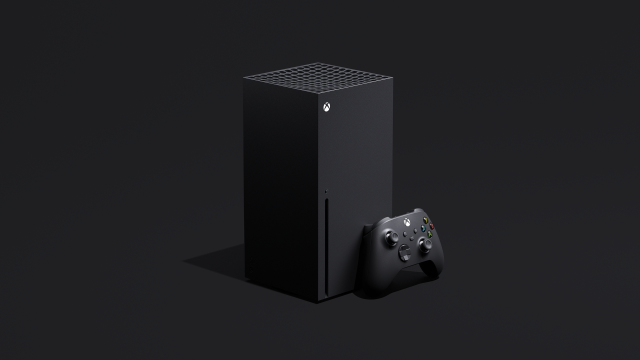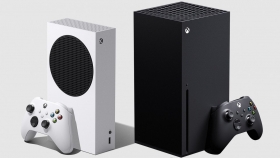
Why the Xbox Series X|S' Lack of Novelty Might Be Its Greatest Strength
“How’s that new Xbox, then?”, I was asked by my non-gaming friends back in early November; they’d read the headlines chronicling Microsoft’s console launch and (correctly) assumed that I’d ordered one ready for launch day. “It’s good!”, I was quick to reply, before following with an uncertain “it does feel a bit like a phone upgrade, though”.
What did I mean by that? Well, neither the Xbox Series S or X have SIM card slots or front-facing cameras; I wasn’t saying that they literally felt like phones. Instead, I was trying to communicate how familiar the consoles felt to their predecessor in terms of the moment-to-moment user experience. After all, the Xbox Series X|S has the same UI, the same apps and all of the same games as the Xbox One—at least at launch it does. In the same way that upgrading from an iPhone 11 to an iPhone 12 isn’t going to change an Apple enthusiast’s life in any meaningful way (even with 5G), moving from an Xbox One to an Xbox Series X|S isn’t going to redefine console gaming for any of us. It’s simply more of the same, only quieter, faster and more powerful under the hood. Is that a little boring? Perhaps, but it’s exactly that sense of boring which could give Microsoft the competitive edge in the coming generation and beyond.

Of course, I’m not daft enough to think that what I’ve just outlined about the iterative nature of the Series X|S is any sort of bold new take, and I’m certainly not about to claim that any of it is an oversight on Microsoft’s part. Doing that would put me alongside people who lambast local councils for how speed bumps ruin their local street racing scene or complain to armband manufacturers for preventing their pursuit of deep-sea diving. In those examples, just like the Xbox Series X|S, the lack of excitement isn’t just intentional, it’s the entire point.
For decades, the launch of new consoles has brought with it great surges of excitement and increased interest from stakeholders on all levels. This pattern, the groundswell of initial interest which gradually peters out as a console ages, has kept the gaming industry in constant growth since the mid-80s, and it’s the exact thing Microsoft has sought to challenge with its latest line of consoles. The Series X|S may have enjoyed its share of frenzied, website-crashing hype and scarcity following its launch, but the similarities between it and the Xbox One appear expressly designed to counteract that frenzy and hammer home one important message: “Relax. It’s just a game machine, a lot like your old one. There’s no need to get excited about these boxes when it’s the games that should matter”. By spreading this message, as well as reassuring consumers that its exclusive games will also be available on PC, Microsoft is trying to erode the ‘must-buy’ factor of new consoles, and in doing so, attempting to dismantle the sails that once helped carry the industry forward.
Pictured: the exact thing Microsoft is fighting against
When a new console hits the market, most manufacturers desperately scramble for new ways to make you crave it. They want you to yearn for their new machines like a starving man yearns for a good cheeseburger. That was even Microsoft’s strategy up until this generation. Now, though, Microsoft’s chief product isn’t a console; the company won’t lose sleep if you eschew the monolithic Series X in favour of holding out with your faithful Xbox One or even sticking with a PC all the way. This time around, Microsoft’s focus has shifted. More than anything, the company is dead-set on selling you a gaming ecosystem, one with Game Pass at its centre. It could live with you never touching an Xbox ever again; as long as you’re a Game Pass subscriber, Microsoft has got what it wants from you.
So, let’s say Microsoft succeeds; all of its seeds bear fruit and all of its shots hit their mark. What happens? Well, firstly, people will cease to care about the new consoles, at least in the same way as before. Think about how people react to smartphone releases nowadays. Unless you’re a ‘phone person’ or your existing handset is freezing up like a child with stage fright, you aren’t likely to give the release of, say, the iPhone 13 much more than a sideways glance and a brief moment’s consideration. After all, you’ve got a phone; it works fine, performs all the tasks you throw its way and it even lets you play Scrabble on the toilet. What else could a new phone possibly do for you? If Microsoft succeeds, that’ll be the end result for consoles too: just exchange Scrabble for Halo and they’re pretty much a 1:1 comparison—especially now with Microsoft’s own xCloud service making high-end gaming on the bog more feasible than ever.

This ain't your daddy's Scrabble
On top of that, though, Microsoft’s success in this strategy will mean its market appeal won’t rely on console sales. It’ll be a Game Pass company first and foremost; the Xbox will become something of a side product. If the console market were a planet filled with oxygen-breathing mammals, Microsoft is trying to flood that planet, leaving all the mammals (read: competitors) to drown while Microsoft grows itself some gills (read: Game Pass) to keep going strong in the drastically altered environment.

Will it actually pan out that way? I don’t think so, not exactly. People will always want to buy the latest machines to play the hot new releases, and consoles don’t release regularly enough to ever feel as insignificant as smartphone releases do (not that smartphone launches are genuinely insignificant, just more so than consoles). I think that Microsoft will fall short of flooding the entire gaming ‘planet’. Instead, it’ll succeed in making itself a sizable watery home where it’ll thrive, gilled-up and competing in a separate space entirely from Sony, who will also thrive, except on land instead of water with its traditional “console generations still matter” approach. When you factor in Nintendo, who is… I don’t know, flying up in the clouds somewhere in this strange metaphor, it seems as if every console manufacturer is going to be just fine for the foreseeable future. In fact, I’d wager that they’ll all manage to exceed the success they achieved last generation.
It’ll all be fine. Microsoft’s not going to go bust; Sony’s not going to go bust; Nintendo’s certainly not going to go bust. Just don’t be surprised if things change a little over these next few years. For the better? For the worse? That’ll be up to you to decide.









COMMENTS